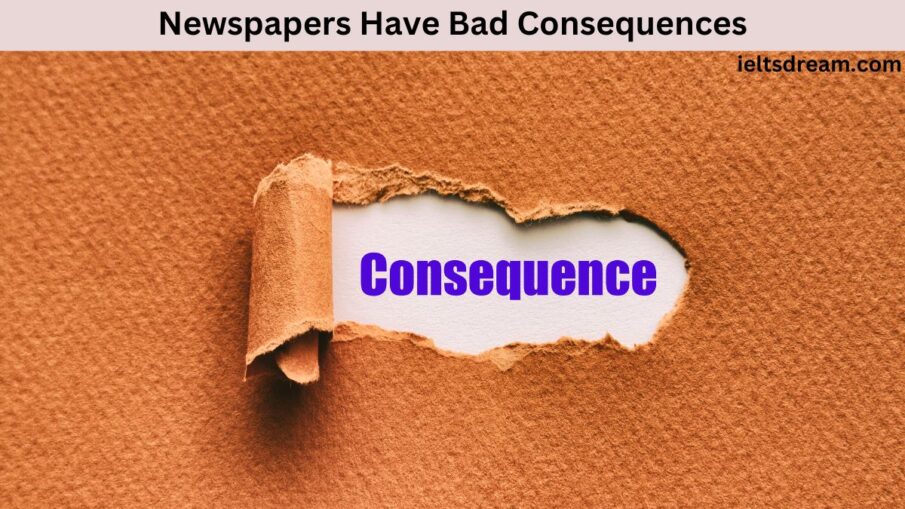Crimes and Other kinds of information on Tv and Newspapers have bad consequences. This kind of information should be restricted to be shown in the media. To what extent do you agree or disagree with the statement?
Sample 1 Crimes and Other Kinds of Information on Tv and Newspapers Have Bad Consequences
The portrayal of crimes and other distressing information in the media has raised concerns about its potential negative consequences. While some argue that such information should be restricted, I disagree with the notion of complete censorship. While responsible reporting and media regulations are important, it is equally crucial to uphold principles of freedom of the press and the public’s right to information.
On one hand, it is undeniable that excessive exposure to crimes and disturbing events can have detrimental effects on individuals, particularly vulnerable audiences such as children or those prone to anxiety and stress. Continuous exposure to graphic details and sensationalized reporting may contribute to increased fear, desensitization, and a skewed perception of reality. Moreover, constant focus on crime news can overshadow positive stories and create a sense of pessimism and mistrust in society.
However, it is important to consider the benefits of media coverage as well. Reporting on crimes and other significant events serves important purposes, such as raising awareness, fostering accountability, and facilitating public discourse on pressing issues. It can shed light on injustices, drive social change, and contribute to the overall well-being of society. Restricting access to such information may hinder the public’s ability to make informed decisions, advocate for change, or engage in constructive discussions about relevant topics.
Rather than advocating for strict censorship, a balanced approach is necessary. Media outlets should prioritize responsible journalism, adhering to ethical reporting practices and considering the potential impact of their coverage. This includes avoiding sensationalism, presenting accurate information, and providing context to events. Additionally, regulatory bodies can play a role in setting guidelines for media organizations to ensure responsible reporting, while still upholding freedom of the press.
Furthermore, media literacy programs can be implemented to equip individuals with critical thinking skills, enabling them to evaluate and navigate media content effectively. Education and open dialogue about media consumption can empower the public to make informed choices about the information they engage with.
In conclusion, while excessive exposure to crimes and distressing information in the media can have negative consequences, I disagree with the notion of complete restriction. Responsible reporting, media regulations, and media literacy programs can strike a balance between the public’s right to information and mitigating the potential harms. By fostering responsible journalism and empowering individuals with critical thinking skills, we can create a media landscape that informs, educates, and positively contributes to society.
Sample 2 Crimes and Other Kinds of Information on Tv and Newspapers Have Bad Consequences
The issue of whether crimes and other distressing information should be restricted from being shown in the media is a complex and contentious one. While it is true that such content can have negative consequences, I believe that complete restriction is not the optimal solution. Instead, responsible journalism and appropriate regulations can address the potential harms while still upholding freedom of the press and the public’s right to information.
It is undeniable that continuous exposure to crimes and distressing information can have adverse effects on individuals. Graphic details and sensationalized reporting can contribute to fear, anxiety, and desensitization. Moreover, the constant focus on negative news can create a distorted perception of reality and undermine trust in society. Vulnerable audiences, such as children, may be particularly affected by such content.
However, it is important to recognize the significant societal benefits that can arise from media coverage of crimes and other important events. Responsible reporting can shed light on injustices, hold individuals and institutions accountable, and drive social change. It plays a crucial role in raising awareness about issues such as human rights violations, corruption, and public safety. Restricting access to such information may hinder public discourse, limit transparency, and impede efforts towards social progress.
To strike a balance, media outlets should prioritize responsible journalism. This includes avoiding sensationalism, ensuring accuracy, and providing appropriate context to news stories. Journalists should exercise sensitivity and discretion when covering distressing events, taking into consideration the potential impact on audiences. Additionally, regulatory bodies can play a role in setting guidelines and enforcing ethical standards for media organizations, ensuring that reporting practices uphold public interest and minimize harm.
Furthermore, media literacy programs can empower individuals to critically evaluate and navigate media content. Education about media consumption and the development of critical thinking skills can equip the public with tools to make informed choices and engage with news responsibly.
In conclusion, while crimes and distressing information in the media can have negative consequences, complete restriction is not the ideal solution. Responsible journalism, appropriate regulations, and media literacy programs can address the potential harms while still preserving freedom of the press and the public’s right to information. By fostering ethical reporting practices and promoting media literacy, we can create a media environment that informs, engages, and benefits society as a whole.


Leave a Reply